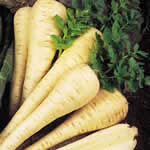Parsnips
The parsnip is a delicious, hardy winter vegetable that is
invaluable for soups and stews.
Soil Preparation
Parsnips need well-drained, finely-grained, weed free soil. Do not add manure,
this will cause the roots to fork. I rake in a few handfuls of Bone meal
before planting
When to Sow
February to April - the seed packets usually recommend February sowing but
this is risky because Parsnips are slow to germinate and if the weather
is too cold they will not germinate at all. I now sow in March or early
April when the soil has warmed a little.
Sowing
Parsnips need to be sown directly in the soil they will not tolerate transplanting
from a seed tray.
Sow the seeds to a depth of half of an inch and then lightly cover with
soil.
If sowing two rows position them a foot apart (30 cm/12 in)
Water the seeds in dry weather and keep the drills weed-free.
Maintenance and Feeding
It is important to keep the plot weed free, especially when the seedlings
are small. Parsnips are slow growers and can be easily smothered by weeds.
Thin the seedlings to about 10-15cm apart and water in dry weather. Feed
a couple of times with Blood Fish and Bone.
When to harvest 
November to February - the first parsnips are traditionally only lifted
after a hard frost. They can be left in the ground over winter and dug as
required.
Varieties
There are traditional varieties and F1 hybrid varieties. The F1 varieties
are smooth skinned and resistant to diseases like canker.
Gladiator (F1)
The original F1 hybrid with smooth, silky skin and large wedge-shaped roots.
Canker resistant and widely available
Archer (F1)
A newer F1 variety with white, tapering roots and smooth blemish-free skin.
Strong germination and a vigorous, uniform grower.
Tender and True (Traditional)
This is a traditional variety. Long roots and a good flavour with good canker
resistance.
Cobham Marrow (Traditional)
Cobham Marrow develops roots up to 8 inches long and is highly
resistant to canker.